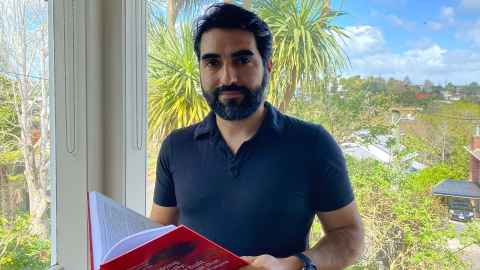If collapse is inevitable, can we at least collapse with grace?
21 September 2021
We may have heard that the future of life on Earth is not likely to sustain life as we have come to know it, that we’re heading toward collapse, but what we do mean by collapse and how can we prepare for a graceful landing?

This is the topic explored by Dr Emilio Garcia, School of Architecture and Urban Planning, University of Auckland, and Professors Robert and Brenda Vale, both from the School of Architecture at Victoria University of Wellington in their new book, Collapsing Gracefully: Making a Built Environment that is Fit for the Future.
As the authors warn in Chapter 1: “Looking at the impacts of pollution, population, food production, industrial production and availability of finite resources leads to the conclusion that collapse is a real possibility, in which case it might be a good idea to have a plan to minimise its effects. What kind of built environment might help to avoid collapse or to minimise its impacts?”
The book investigates the concept of collapse in the built environment, as that is the location of society, where the process of collapse occurs, says Dr Garcia. “Fifty percent of the population live in cities, but the countryside is also often modified by people, typically to produce food, and so it too is considered part of the built environment.”
Myths - or at least widely held beliefs - that are explored by Dr Garcia and his co-authors include our faith in economic growth, what they identify as a fundamental contradiction between economists’ faith in endless growth and the reality of finite resources.
We need to align our economic outlook with the environmental predictions for 2050, they suggest: “Maybe it would be a good idea to see how we have done in the thirty years from 1990 to 2020 in order to get an idea of how well we might do in the thirty years from now until 2050 in order to try to avert collapse or at least to try to collapse gracefully.”
We may think we are buying smart phones, but we are not smart enough to recover the valuable materials in them when we throw them away.
Technology is often touted as that which will save us from ourselves, but that is also problematic, for myriad reasons, including the fact that technological developments tend to produce a lot of waste.
Garcia and his co-authors marshal the evidence: “In 2016 some 44.7 million metric tonnes (Mt) of E-waste were produced, and this was predicted to rise to 52.2 Mt in 2021, which means E-waste is growing at a yearly rate of 3-4 percent.”
In 2019 the iron, copper, and gold in this waste together with other lesser components had a value of around US$57 billion but only 17.4% was recycled. “We may think we are buying smart phones, but we are not smart enough to recover the valuable materials in them when we throw them away.”
The concept of sustainability is vulnerable to so-called green-washing – the book highlights a number of buildings that have received architectural accolades as models of sustainable living, but which have not withstood the test of time, or weather events such as floods.
What exactly is sustainability? It’s not as complicated as we might be led to believe, says Dr Garcia, and often it’s lifestyle choice – making do with less. “Picture Kim Kardashian, and then compare her to how your grandmother lives or lived. The way your grandmother lived or lives, is likely to be closer to living sustainability.”
But this is not a book about the end of the world and hopeless apocalyptic scenarios, he says. “It is about understanding change in how and where we live. Collapse is inevitable, but in the built environment collapse can and should be a manageable situation, an opportunity for change - especially given that the built environment tends to last a long time.”
Media contact
Margo White I Media adviser
DDI 09 923 5504
Mob 021 926 408
Email margo.white@auckland.ac.nz